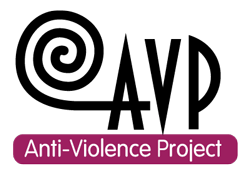Everyone has the right to live free from violence. Ending gender-based and sexualized violence is our collective responsibility in order to build a safer and more inclusive world. At the Anti-Violence Project, we like to talk about working toward creating a culture of consent as one way of replacing rape culture. This means bringing consent, respect, and care into every aspect of our daily lives and into all of our relationships.
One of AVP’s main activities is to prevent gender-based violence through outreach and education. We believe that knowledge is power, and that increasing awareness of the issues around gender-based violence is one of the most effective ways to create positive social change.
How can I get involved in preventing gender-based violence?
A great way to get started is to increase your own understanding about the impacts and root causes of gender-based violence by attending our Understanding Consent Culture Workshop or learning some practical skills at the Supporting a Survivor workshop.
If you want to get involved in our outreach, support, and education initiatives on campus and beyond, consider volunteering with us. Check out our volunteer page to find out more about the super-informative and comprehensive volunteer training program that we run once a year.
AVP also partners with the University of Victoria Students’ Society to run the campaign Let’s Get Consensual, which seeks to promote consent on UVic’s campus. Volunteering with Let’s Get Consensual is a great way to inspire others on campus to engage in prevention work. If you’re interested in getting involved with the campaign email campaigns [at] uvss [dot] ca
Some more prevention ideas
Inspired by the work by many others, including Project Respect, Jackson Katz, and the White Ribbon Campaign.
- Practice consent in all of your relationships (e.g. with friends, family, coworkers, partners).
- Learn about gender-based violence and all forms of violence – and make the connections between individual acts of violence and systems of oppression. Racism, sexism, colonialism, gender-based violence, homoantagonism, ableism, classism, transantagonism all are forms of violence and are interconnected.
- Believe survivors. By supporting the survivors in your life, you can work to end violent victim-blaming myths and make it easier and safer for survivors to access healing.
- Take responsibility for how much power you have, how much space you take up, and your actions and behaviours. Learn about the connection between privilege and violence. Ask yourself: “Do I contribute to, or oppose violence with my actions, words or silence?”
- Listen to people who have different experiences of violence. Read anti-violence blogs, books and other resources, and attend workshops and events.
- Take action against all forms of violence when you are able to oppose it (with care for your own safety). Speak up when you hear violent or oppressive language or comments.
- Start a discussion group and engage with people in your life or in your community about myths, oppressive norms, and stereotypes about gender, class, race and more. Find a way to ensure that your own learning continues while also sharing the knowledge you have.
- Learn about myths and bust them when someone is speaking them or when something is promoting them.
- Contribute to shifting and changing the culture of violence. Take part in or support groups that actively oppose violence. Significant change is possible when we take collective responsibility for shifting the violent norms that exist in our society and communities.
Further reading
Here are some other pages and blog posts related to prevention work:
